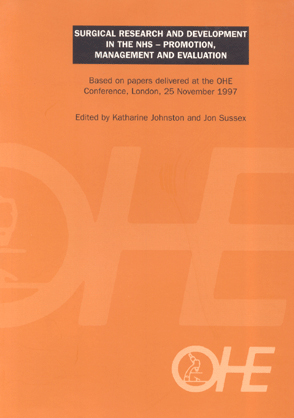Unlocking the Value of Combination Therapies

Based on papers delivered at the OHE Conference, London, 25 November 1997.
Based on papers delivered at the OHE Conference, London, 25 November 1997.
The UK National Health Service (NHS) makes a substantial investment in research and development (R&D) in order to maintain and improve the services it delivers. The NHS R&D programme is aimed at providing new knowledge that is generalisable and for wider public dissemination. This entails not only innovation but also evaluation and diffusion of health care technologies. Encouraging appropriate R&D in the NHS presents a challenge to health policy, if it is to:
• stimulate innovation in new services and ways of delivering existing services, in areas consistent with the needs of the NHS and with government priorities;
• obtain value for money in the NHS;
• ensure the diffusion of cost-effective technologies and restrain the diffusion of other, or unevaluated, technologies; and
• ensure that the net gains from innovation and diffusion of technologies are maximised.
These concerns are relevant for R&D relating to all types of health technologies, whether surgical, medical, diagnostic or preventive. In order to address these concerns, there is a need both for evaluation of all health technologies and for a greater understanding of the incentives for the stakeholders involved in the innovation, promotion and adoption of technologies.
The 1997 and 1998 NHS White Papers for England, Scotland and Wales (Department of Health, 1997 ; Scottish Office, 1997 ; Welsh Office, 1998) and the 1998 consultation paper for Northern Ireland (Department of Health and Social Services, 1998) all define general principles for the whole NHS, and share the same strategic aims of partnership and high quality services. In the particular context of R&D, the emphasis on quality and improving clinical effectiveness is the most relevant policy theme. Following the White Papers, the National Institute for Clinical Excellence (NICE) has been established (on 1 April 1999) for England and Wales to appraise new and existing health technologies and provide clinical guidelines and methods of clinical audit. Clinical governance, an initiative to assure and improve clinical standards at a local level throughout the NHS, has also been introduced. In England and Wales the new Commission for Health Improvement supports and oversees the quality of clinical governance and of clinical services. In Scotland the issues of effective care and of the quality of care are being addressed by the new Health Technology Board for Scotland (HTBS), which will evaluate and provide evidence on the cost effectiveness of all innovations in health care. At the time of writing, arrangements for Northern Ireland have yet to be confirmed, but it is certain that the emphasis on improving the quality of health services will apply with equal force there too.
All NHS R&D operates within this changing NHS environment and a growing culture of evaluation. There are specific features of surgical R&D, however, that result in its promotion, management and assessment being distinct from medical R&D. This book attempts to identify and discuss these surgical issues. The book is based on the papers delivered and discussed at the Office of Health Economics conference held in London on 25 November 1997, updated to reflect subsequent developments. The text provides a commentary on the key issues in surgical R&D written by experts in the field and brings together recent thinking on how surgical R&D may best be promoted, financed, managed, evaluated and used by the NHS in the future.
Surgical Research and Development in the NHS – Promotion, Management and Evaluation
